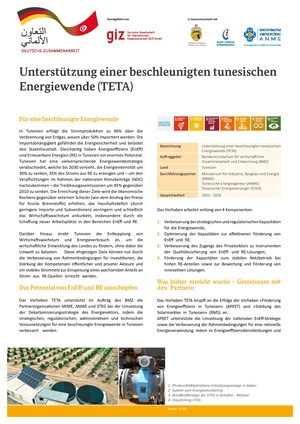Supporting an accelerated energy transition in Tunisia
Context
In Tunisia, electricity is produced almost exclusively by burning natural gas, more than half of which is imported. This dependence poses a threat to energy security and is a strain on the national budget. At the same time, energy efficiency (EnEff) and renewable energy (RE) have enormous potential in Tunisia. The country has adopted an energy transition strategy that will allow primary energy demand to decrease by some 30 per cent and to generate 35 per cent of its electricity from RE by 2030. In addition, greenhouse gas emissions are to be reduced by 45 per cent compared to 2010, with the target of achieving climate neutrality by 2050. This protects Tunisia from rising energy prices, eases the burden on the state budget and promotes value creation and employment. However, implementation of the energy transition strategy is being delayed due to slow, complex procedures.
Objective
Tunisia has better strategic, regulatory, administrative and technical conditions for an accelerated energy transition.
Approach
In cooperation with the country’s Ministry of Energy (MIME), the Tunisian National Energy Agency (ANME) and the Tunisian Company of Electricity and Gas (STEG), the project supports the acceleration of the energy transition by:
- Improving strategic and regulatory frameworks that contribute to the decarbonisation of the energy sector
- Simplifying and digitising administrative processes to accelerate the implementation of funding programmes for EnEff and RE projects
- Training actors in the private sector to improve the quality of EnEff measures and RE systems
- Implementing innovative approaches for more power system flexibility to ensure stable grid operation with increasing shares of RE in the grid.
In addition, the project chiefly supports activities in rural regions and promotes digitalisation and gender equality in the energy industry.




















